|
|
Welcome to my travel log! You will find here a lot more than in the travel reports, stripped from political correctness. Enjoy! 
Apr 24, 2007 02:00 PM Kotu - the last minutes in the sun
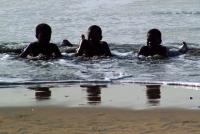 My flight home was in the late afternoon. This meant that I had almost an entire day in the sun to spend. Kotu beach, next to Fajara, is one of the better places in The Gambia to soak up the typical Gambian beach ambiance and animation. The beach boys, the juice pressers, the assistant juice pressers, the fruit salad ladies, the fake massage ladies, the shop touts, the boys showing off for the foreign ladies with their fitness and agility, the kids kicking a ball and playing with the waves. I love the country.
My flight home was in the late afternoon. This meant that I had almost an entire day in the sun to spend. Kotu beach, next to Fajara, is one of the better places in The Gambia to soak up the typical Gambian beach ambiance and animation. The beach boys, the juice pressers, the assistant juice pressers, the fruit salad ladies, the fake massage ladies, the shop touts, the boys showing off for the foreign ladies with their fitness and agility, the kids kicking a ball and playing with the waves. I love the country.
|
Apr 23, 2007 02:00 PM Bakau - back in The Gambia
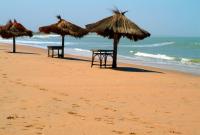 After swiftly driving through Casamance, a part of Senegal, which was betrayed by the first president of Senegal, and still waiting for its independence, which has not been stable with regard to safety, I found myself back in The Gambia. I only stopped in Ziguinchor, the capital, to take out some money from the ATM machines. The city was fine and had some good examples of colonial architecture.
After swiftly driving through Casamance, a part of Senegal, which was betrayed by the first president of Senegal, and still waiting for its independence, which has not been stable with regard to safety, I found myself back in The Gambia. I only stopped in Ziguinchor, the capital, to take out some money from the ATM machines. The city was fine and had some good examples of colonial architecture.
Instead of Fajara, I decided to relax in Bakau. I was not aware how great the area was. The Cape Point in Bakau, complete with fine hotels and restaurants, also boasts magnificent beach. One of the hotels had a great beach bar. I spent a lot of time there indulging on fruit shakes and some interesting cocktails.
In the evening, the locals set up two football matches on the beach. It was really enjoyable to watch them play. They were really serious and passionate about the game. It was much, much better watching them than the English football league, twisted by money, fake injuries and melodramatics.
|
Apr 22, 2007 02:00 PM Bissau - failing nightlife
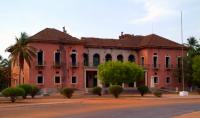 After quickly organising the Gambian visa, to be able to re-enter the country, I went on a quick tour around the capital again. I loved the old Portuguese quarter full of atmospheric alleys and crumbling old buildings. It was a bit untidy, but felt safe, despite claims from my driver and Ernest, who were a little nervous of me wandering around at night on my own.
After quickly organising the Gambian visa, to be able to re-enter the country, I went on a quick tour around the capital again. I loved the old Portuguese quarter full of atmospheric alleys and crumbling old buildings. It was a bit untidy, but felt safe, despite claims from my driver and Ernest, who were a little nervous of me wandering around at night on my own.
The nightlife of Bissau, allegedly unrivaled in West Africa, did not impress me. But apparently it was not the fault of the Guineans. It was the fault of the power cuts. No disco could operate without power. So, I have nothing to report on this...
|
Apr 21, 2007 02:00 PM Bafata - a colonial, charming town... and a little boring
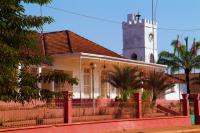 A colonial town up the Geba River is a small crumbling town. Architectural monuments are not plentiful and the place feels like it had been forgotten many, many, many years ago. Yet, this small town had something about it that I thought it was nicer than Bissau. Perhaps it was its interesting position by the river. Or it might just have been the afternoon sun...
A colonial town up the Geba River is a small crumbling town. Architectural monuments are not plentiful and the place feels like it had been forgotten many, many, many years ago. Yet, this small town had something about it that I thought it was nicer than Bissau. Perhaps it was its interesting position by the river. Or it might just have been the afternoon sun...
I originally planned to stay there overnight, but the eerie sleepingness of the town simply scared me. So, we stopped only for a quick, and late, lunch. The only open restaurant in the town ran out of lunch food (chicken and rice), but managed to scramble a few eggs with sausage and tomatoes and pack them into a think baguette. It was lovely!
I had to venture to their toilette. Apart from a toilette bowl with no seat or a flush mechanism, I found there an impressive collection of spiders. Big and small. Hairy and smooth. I think that they might have represented at least twenty different species.
While eating my egg and sausage sandwich, I tried to forget that this place appeared not to have running water...
The Portuguese family, who ran the restaurant was in fact leaving in very modest conditions. The house was crumbling. It had not seen fresh paint since the time it was constructed, it seemed. I struggled to understand why they kept going on living in the middle of nowhere in such conditions. Their only entertainment was the satellite television showing silly quiz and competition programmes broadcasted from Brazil.
Well, as we were leaving the town, I stopped a few times to snap some of the more interesting examples of colonial architecture. Should this town be ever renovated, it will be one of Guinea Bissau’s loveliest little towns. Of course there should be something of interest there to lure travellers, as now there is absolutely nothing. I guess if the authorities wanted to make it an architectural gem, renovated the buildings and painted them in vivid pastel colours, it might be enough just to go there and relax at the river.
|
Apr 20, 2007 02:00 PM The Bijagos - Ilha de Bubaque
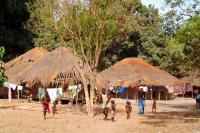 Ilha de Bubaque is an island farther from the mainland. Its main infrastructure advantage is a dusty air strip, which serves a few international charter flights. For the Bubaque island is where Guinea Bissau’s tourism begins (and ends!). A few hotels are being maintained in the high season. This gives the locals some additional way of earning.
Ilha de Bubaque is an island farther from the mainland. Its main infrastructure advantage is a dusty air strip, which serves a few international charter flights. For the Bubaque island is where Guinea Bissau’s tourism begins (and ends!). A few hotels are being maintained in the high season. This gives the locals some additional way of earning.
Yet, the island’s main attraction are the beaches and... beaches. Oh, yeah, and possibly also the deep sea fishing trips. Apart from that, there is seriously little else to do there. It is however a good base for exploring many other islands - those where saltwater crocodiles, hippopotamuses and turtles can be spotted.
I could only spend a day on the island, and with absolutely no plan, I perhaps overpaid for a four wheel ride across the island. I visited a few villages and went to the main beach, at the south-western end.
I took a local with me, Nandinho, who also accompanied me on the boat ride from Bissau. I liked him, because he smiled constantly. Not only when talking to me (that was a challenge, since he did not speak English and his Spanish understanding was limited) but also when dealing with others. Anyway, although Ernest referred to the Bijagos as tough people, they all looked very friendly to me, and rather good looking.
Nandinho said that I ought to get some sweets for the kids (as it turned out also for some grown-ups) and tobacco for chiefs of the villages. I did not mind and made him in charge of dispensing the items as appropriate.
To be completely honest, I did not find the villages anything special compared to many African places I had seen before. It was an enjoyable ride though and the beach at the end of the trip was superb. It was almost completely deserted. I saw only a couple of tourist walking along the five kilometre stretch. The peculiar thing about the beach were the cows relaxing there.
I saw many defunct hotels and establishments, some of which must have been exceptionally grand, judging by their scale and actual location. They were now decaying, which was a sad sight. Apparently, it would be too much of a struggle for the locals or foreigners to bring them to their glory, or at least make them operational again.
Ernest invited Nandinho for dinner (for which of course I was paying :)) at the Chez Dora, where we staying. It was a good idea and we enjoyed two great grilled fish. Both were over 40 centimetres long and filled up all three of us nicely. Very nicely!
I convinced the guys that we ought to have a stroll after such a grand dinner to avoid producing the excess of fat (not that either Ernest or Nandinho had to actually worry about it). So we went down to the port only just to sit down and have a beer! The bar, called Dalilann, run by a French speaking West African guy, was showing ‘Troy’ starring Eric Bana and Brad Pitt. The quality of it was terribly poor and almost half of the action was not visible. This was a full panoramic widescreen film - a true full blown Hollywood production, but it was shown on a small and completely decrepit television set. It was run from a DVD dubbed in French!
Then, we moved again. And again because this was I who wanted to move around and at the same time explore more places. Nandinho was a great asset, as neither I or Ernest knew the island and Ernest felt a little uncomfortable because of that. It was a little funny to see him like that.
The second part of the stroll was about three hundred yards. The station was a ‘djazz’ bar, which instead of jazz played music from Senegal and Cabo Verde. It was located almost exactly opposite our final destination, the Tatumi Discoteque.
Tatumi was almost completely dark inside. A few violet fluorescent lamps attached to the ceiling kept revealing boogers’ white clothing and teeth. The music was failing a few times, and I just thought that it was due to faulty power supply. Tatumi was located in the part of town, which was connected to the communal power generator, unlike the rest of the island. So, I guess the DJ was simply struggling with the rapidly ageing equipment.
At one of the ends of the dancefloor, there were a few tables surrounded by benches covered with faux leather (or something similar). Yet, the bar, right by the entrance to the venue, was empty. The locals instructed me that one could bring their own drink, including any type of booze. So, I gave Nandinho a few thousands of CFA so he could do his magic and fetch cheap beers. I got local stout. It was great!
The disco was very quiet. I expected more from a Saturday night! I lasted until 1 a.m. I told the guys that I thought it was boring. They tried to persuade me to linger a little longer, as it was definitely bound to become busier. I passed. They walked me bak to the hotel and turned back. The next morning, they confessed the disco was quiet all night. It did not stop them to stick around until 4 o’clock in the morning, though!
Laurent, who was supposed to take us back to Bissau was hard to locate. The fact that my mobile with the local provider, Areeba, could not catch enough signal was not helping. Eventually, I used a local telecentre to call a guy in Bissau and ask him to call Laurent and confirm the meeting point.
Finally, I had to stroll all the way uphill to the other side of town for the lift. It was worth it though and I was glad that I did not listen to Ernest or Dora trying to convince me to take a local pirogue. The pirogues, referred to as ‘public transport’ are often overloaded. They do not carry any safety equipment, leak and one had to put up with the smell of fish and various species of domestic animals. And the boat takes from four to six hours to reach the capital.
The ride with Laurent was fast and comfortable. I could clearly see that he enjoyed fast boats and I reached Bissau in 90 minutes. Plus he only charged me 25,000 CFA. The best value ever!
|
Apr 19, 2007 02:00 PM The Bijagos - a perfect archipelago
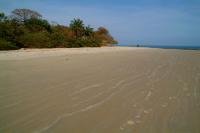 An archipelago of small islands, so remote from the civilisation point of view, that my friend Ernest knew very little about them. He had heard about them tough. He referred to the Bijagos people who lived there, as black and tough. However, he had never ventured to the islands in his life.
An archipelago of small islands, so remote from the civilisation point of view, that my friend Ernest knew very little about them. He had heard about them tough. He referred to the Bijagos people who lived there, as black and tough. However, he had never ventured to the islands in his life.
The archipelago is an important biosphere reserve, an escape destination for migratory birds and sea turtles.
Life on the islands had been simple for centuries. It is hard life, too. The Bijagos people have little to sustain themselves. Apart from fish, they have nothing.
The archipelago has been isolated from the mainland for centuries. Both logistically and culturally. The tribes, the Bijagos, who have lived there enjoyed rather peaceful times when the civil war raged the country on the continent.
To get there, one needs to catch a boat. A near-death trap - meaning a public transport boat, or very expensive a private speedboat. There are a number of tourist offices in Bissau, which might help to get a decent transport a little cheaper, but their boats do not travel every day.
|
Apr 18, 2007 02:00 PM Bissau - ruined capital of the country
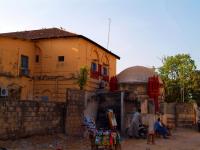 The ferry did not come until 10 o’clock the next morning. I did not think all the cars would fit on it, but they all did. However, we sat on the ferry for an hour, as it was too heavy and the low tide kept it stuck on the bank.
The ferry did not come until 10 o’clock the next morning. I did not think all the cars would fit on it, but they all did. However, we sat on the ferry for an hour, as it was too heavy and the low tide kept it stuck on the bank.
I was seriously annoyed. I had to be in Bissau in time to visit the Gambian and Senegalese embassies so I could travel back. I did not expect issues with the Gambian officials and I knew I should go there first to obtain another single entry visa. Rumour had it that one could also be obtained at the border, however I did not really want to risk it. And since the process should be smooth at the embassy in Bissau, that was my plan.
Yet I did not know that both embassies would be closed! I had to wait until Monday.
In the end, it took just an hour to get the Gambian visa and with the Senegalese I did not even bother. I explained at the border on my return that the embassy in Serekunda made a mistake in my passport. They did not even ask any questions. Had I known it was going to be so easy, I would have not stressed this much.
The first sight of the country’s capital city, right on the coast of the Atlantic Ocean, at the mouth of the Geba River, left me rather unimpressed.
Allegedly, it used to be an attractive little place once. However, the Guinea Bissau Civil War ruined all important and nice buildings and structures. Even the Presidential Palace was destroyed! As a consequence, there is relatively little to see in the capital. Sightseeing takes only couple of hours and at a very sluggish pace.
After tracing a restaurant, which I chose from my guidebook (and finding it closed for good), I took a stroll along Bissau’s main artery - Avenida Amilcar Cabral.
At the days of its glory, it must have been a great avenue. Grand colonial buildings, now mainly occupied by government offices, make a quite an imposing impression. There is also a cathedral and complete ruins of something now completely unrecognisable, remnants of the terrible civil war.
I headed from the ruined presidential palace towards the harbour. Then I turned left along the container terminals in the direction of the large Portuguese fort. The fort is still in use by the military and completely off limits for visitors.
Directly at the front of the fort, there is a nameless bar serving cold beers and a limited selection of soft drinks. It appears as a pleasant place shaded by giant trees. It has a nice garden with white plastic tables and chairs and a roofed area with simple wooden tables and seats. However, as I spend a two or three hours there, a fine selection of rather dodgy characters came.
I did not intend to spend so much time there, however it took me a while to finalise a deal for a boat transfer to the archipelago.
|
Apr 17, 2007 02:00 PM Bakoteh to Casamance to Sao Vicente
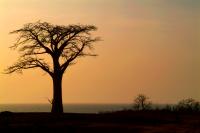 Due to the delay caused by the Senegalese embassy, I had to rethink my itinerary. My instinct and Ernest dictated to shorten a stay on the island of Bubaque from two and a half days to one and a half days. Since I had my own transport, and the country was compact, we agreed that even with one day short, I should be able to see a lot - at least all the places I wanted to visit.
Due to the delay caused by the Senegalese embassy, I had to rethink my itinerary. My instinct and Ernest dictated to shorten a stay on the island of Bubaque from two and a half days to one and a half days. Since I had my own transport, and the country was compact, we agreed that even with one day short, I should be able to see a lot - at least all the places I wanted to visit.
There were two borders to cross. The first one into Casamance (Senegal) and the second one into Guinea Bissau. All borders, to my great surprise where easy to cross, and I had no problems with anything.
The only issue was with the car. It generated a few problems and delays at the borders and inside Guinea-Bissau. Everyone wanted a slice of the pie called ‘white man on the road’. I was just getting annoyed with my driver and Ernest that they were willing to depart from my money so easily. Too happily they were ready to pay up at each checkpoint.
Anyway, it was painless at the borders and the immigration and customs officers were friendly. This actually astonished me. I was preparing for the worst. Many people were preparing me, in fact.
Although it seemed that all went smoothly, many checkpoints, some of them surely fake, slowed me down considerably. I thought it was frustrating enough for me. Then, I was faced with crossing the Cacheu River. The ferry stopped operating at 7 p.m., despite all the assurances received from the officers at the frontier, who claimed that the boat was operating 24 hours.
Well, I was stuck. With many other people and vehicles. This meant that I had to spend a night in the middle of nowhere. This middle of nowhere was actually a CFA 2000 across the river from Sao Vicente. The side of the river bank I was stranded at had absolutely no facilities. There was no hotel, no shop, no bar, no place or anyone selling food. What a business opportunity!
I asked Ernest to take a canoe and fetch a lot of beers from Sao Vicente so we could party and forget about the issue if being stuck at one of the banks. They actually got stressed with our situation and perhaps thought that I was going to be very angry. I did mention that it was their fault (really of being so naive) as they did not check all the facts and just trusted everyone telling them what turned to be lies. I had to tell them not to be alarmed because I did not care that much and that I was going to make a party by our car. They were shocked only at very the beginning then they understood my point and joined me in celebrating a piece of adventure.
The beers they fetched from Sao Vicente did not last long and as we got increasingly more thirsty, fresh ideas kept popping in our head how to secure more provisions. The difficulty was that the man and his boat, who obliged (for a price of course) before was in bed and crossing the river was no longer an option.
Eventually, we paid a taxi driver and put a local guy inside (whom we promised to give a beer afterwards - and we surely did) and my brother Ernest, who spoke the language, and sent them to a local shop a few kilometres back towards Ingore to bring more alcohol. Just beer actually.
|
Apr 16, 2007 02:00 PM Serekunda - getting organised
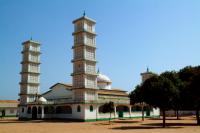 Following my decision to spend a little more money but also see a lot more, I began searching for a car rental in The Gambia. Early - still from the chocolate leather sofa of my London flat. I had to look in The Gambia, since no car rental was available in Guinea Bissau. Well, none to be arranged remotely. Certain options were perhaps possible with a couple of upscale hotels in Bissau. Yet, I wanted to research and, if at all possible, make arrangements before landing in Africa.
Following my decision to spend a little more money but also see a lot more, I began searching for a car rental in The Gambia. Early - still from the chocolate leather sofa of my London flat. I had to look in The Gambia, since no car rental was available in Guinea Bissau. Well, none to be arranged remotely. Certain options were perhaps possible with a couple of upscale hotels in Bissau. Yet, I wanted to research and, if at all possible, make arrangements before landing in Africa.
I got annoyed pretty quickly with it, though. As soon as I typed ‘car rental in The Gambia’ in a search engine, thousands of travel websites got listed. However, all of them lied disgustingly. They claimed to offer car rental services in the country on their home pages, but further enquiry always resulted with an apology that they in fact did not rent cars in The Gambia.
One of the more annoying ones was Hertz. Their location list included The Gambia, yet when it came to make a reservation, the website returned a result stating that such location did not exist.
A slightly friendlier AVIS website returned a result that both (yes, just two) of their vehicles were sold out. At least for the period I wanted it rent one.
When I almost lost my patience, I clicked on a Dutch website dedicated to travellers support in The Gambia, which claimed that there were also other car rental companies around. They even provided a list of options.
One of them was the AB Car Rental, a company affiliated with the Senegambia Hotel in Kololi. They even had a very basic website, which listed their email address. I wrote an email to them and waited.
Then, a few minutes later, I discovered another Dutch website (travelpoort.nl), which showed the AB vehicles and prices. The cars were very basic and old. The only interesting wheels were: fully air conditioned Peugeot 406 (one), fully air conditioned Mitsubishi Pajero and Montero (one of each), and a comfortable Toyota Landcruiser (one). The other option was a contact to a guy, who owned a robust 4x4 vehicle and offered rides in the region - also outside The Gambia. That was exactly what I wanted. So, I sent an email to him. And waited. The prices varied from €60-€95 a day.
The AB Car Rental replied next day that they did not rent cars to Guinea Bissau. They were happy to offer cars to be taken to Senegal, but not farther than that. I asked them to recommend someone, who would be willing to drive me to and around Guinea Bissau for seven days.
Having known West Africa for a while, I knew than I could trust no-one. So, I called my Gambian brother Ernest and asked him to investigate. He said that a car was not going to be a problem, since he had friends with cars, who would be happy to go to Guinea Bissau for a price, of course. I knew those friends of his. They just wanted to profit from knowing Ernest, who knew me. Me, the wealthy white man, tourist from Europe. I was there before, for a half a day drive to the Gambia’s southern beaches, one of his friends charged me two days worth of car rental - by the Gambian prices!
I made it clear to Ernest that I was not going to be nice to his friends who happily overcharge me on every occasion, and that I wanted a good 4x4 car with air conditioning and comfort. I told him that I knew what the official prices of the rental companies were, and there was no chance to rip me me off.
I was preparing myself to consider the prospect of needing to use just a regular transport in The Gambia, Casamance and Guinea Bissau. However less convenient, using public transport, or even just taking the entire shared taxi (not so inconvenient) for my own use, was going to be disproportionally cheaper. The ride on a public transport from Brikama in The Gambia to Bissau via Ziguinchor would cost approximately CFA 9,000. That takes half a day. Compared with a rental that costs approximately CFA 30,000 per day plus fuel, it is definitely worth considering.
The only issue with public transport is that it is rather unreliable and takes considerably longer than own transport. Although a shared taxi between A and B does not stop on the way, it takes time before it is full. And should one want it to stop for taking pictures or physiological needs, it is harder to negotiate this. I guess I do not need to mention that with a rental car one has full flexibility regarding the timetable, schedule of breakfasts, lunches, etc.
Should I have more time for my travel, I would certainly opt for public transport in this case. First of all, I would have my escort (a real bodyguard) with me, who knew the area very well. Second of all, it would be definitely more adventurous and would bring the authentic African experience again. I have had plenty of African experiences to date, and I loved it. I would not say no to even more of it, provided I was not in a rush and just could soak the atmosphere of the culture, customs and land, where time does not matter at all.
Well, Ernest lived up to his challenge and organised a car. It was one of his fellow chaps, who came from Guinea Bissau. They had an old-ish Nissan Patrol. At least it was in a good condition and the guys promised that the air-conditioning was fully operational.
I met with guys and told them that I was going to strike a deal with them for the price I would pay with AB Car Rental. We did not even bargain that much, as I thing it was an excellent deal for them and they were utterly ecstatic!
|
Apr 15, 2007 02:00 PM Serekunda - one visa was easy, the other was not!
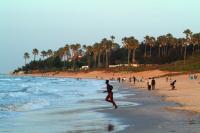 When Monday came, I rushed to the Guinea Bissau embassy again. It was supposed to open at 08:30 am, but guess what, nobody came until 09:00. At least when they did, I got my visa within 90 minutes.
When Monday came, I rushed to the Guinea Bissau embassy again. It was supposed to open at 08:30 am, but guess what, nobody came until 09:00. At least when they did, I got my visa within 90 minutes.
My problems, surprise ... surprise, started at the Senegalese embassy. There was no way they wanted to issue a visa for me on the same day. They claimed it was a two day process and this way, they ruined my plan for the trip. It did not help that I brought local people who knew the embassy staff.
After two days, it was clear to me that the process of getting the Senegalese visa was amongst the most fucked up procedures on this planet. It took two days for the embassy to see if I can get a visa or not. Allegedly, for citizens of certain countries the procedure requires the staff to contact the Immigration Office in Dakar. After clearance is received, the local embassy or high commission begins to kick off the actual process.
The idiots actually stamped a wrong visa in my passport. Clearly, they did not read my application at all. I requested a transit visa with two entries. They gave me an ordinary single entry visa for 7 days! One has to be a complete imbecile to do that. This obviously meant that I needed to go through the same ordeal and shenanigans in Guinea Bissau on my arrival. I seriously was not looking for it.
My alternative was to try to bribe the officials at the borders to let me pass. Theoretically this should be possible, yet expensive.
|
Page:
 61 62 63 64 65 66 67 68 69 70 71
61 62 63 64 65 66 67 68 69 70 71

|
|
|
